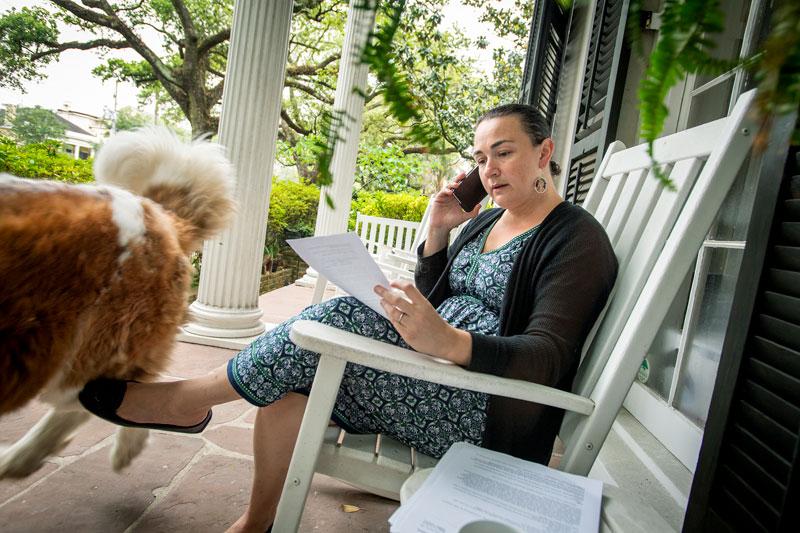A ray of hope in the crisis, Dr. Kendra Harris shines light on needs of healthcare providers
Leave it to Dr. Kendra Harris to find the silver lining in the coronavirus epidemic that has so greatly affected New Orleans. Harris, chair of the Department of Radiation Oncology at Tulane University School of Medicine, is optimistic by nature and has a can-do spirit. As the city has been one of the hardest hit during the COVID-19 pandemic, Harris has discovered among the Tulane team an “outpouring of love and care” — some of it instigated by her.
In mid-March when the first COVID-19 case was recorded at Tulane Hospital, Harris became alarmed that “we were going to have a lot of unmet needs on our frontline teams.” She was particularly worried about residents, the doctors in training at the medical school, who would suddenly have unexpected childcare expenses because schools and daycare centers were closing.
She also wanted to give support to other frontline healthcare workers, including nurses, custodians and registrars. “They are coming to work. They are risking themselves and their families. They’re showing up and saving lives.”
“This is a small way to say we see you; we value you. Your work is important. And we’re going to try to get you the things you say you need.”
Dr. Kendra Harris, chair of the Department of Radiation Oncology at Tulane University School of Medicine
Harris, under the leadership of School of Medicine Dean Lee Hamm, partnered with university administrators to establish the Tulane Frontline Providers Fund: Green Wave Heroes.
In the meantime, the university has offered emergency stipends for childcare expenses to the families of affected medical residents, at a cost of more than $10,000 per week, through the natural end of the school year.
“My intention is to pay that back in full through fundraising,” said Harris.
To raise funds, Harris started calling a list of 1,000 former Tulane medical school residents, who have gone on to jobs in other states. Now current medical school students are helping her make calls. “We’re making our way through the list, and the generosity is breathtaking.”
She also turned to other needs at the hospital and clinic. “When we reached out to the program directors, the first need called out was food — coffee, breakfast, lunch.”
By the end of last week, with contributions from individual donors such as Jill (NC ’85) and Avie Glazer and their daughters, Kendall (SLA ’13) and Libby (SLA ’15) and others as well as corporate grants and a significant gift from the Jewish Federation, the Frontline Providers Fund had delivered 5,000 meals to nurses and doctors.
The fund has also provided scrubs to medical staff. And early on, the fund decided that all meals and additional needs would be purchased from locally owned businesses exclusively.
“This is a way to show the team members the love that is felt for them in the community for the work that they are doing,” said Harris. “This is a small way to say we see you; we value you. Your work is important. And we’re going to try to get you the things you say you need.”
As chair of radiation oncology at the Tulane Cancer Center, Harris has taken dramatic steps to keep her patients in need of daily radiotherapy protected from COVID-19. Patients receive radiation treatment outside of regular clinic hours, in the early morning and late afternoon. She is determined to not let the coronavirus crisis interfere with treatment plans — and she does not want her patients exposed to COVID-19.
As a result of these precautions, “We’ve not had a single patient or single person who is needed in person at work each day in my department test positive for COVID,” she said.
“Cancer does not care about the epidemic,” she added.
She said she feels pride in Tulane medical school and the university’s reaction to the crisis. “A natural disaster has a start, a finish and an aftermath. This epidemic is different — and we expect to need plans over the intermediate and long term, or until a high-quality vaccine is developed that works over time.”
Long-term support for frontline workers is essential for Tulane to continue to do what it has done to provide exemplary health care, said Harris. The needs among Tulane family frontline members are unlikely to dissipate.
“I think, honestly, no one in the Tulane family thinks we’re going back to the way things were, and the pride we all feel about meeting this crisis head-on is palpable. Everyone is showing up, really doing their part,” said Harris.
But to be in a position “to recognize the needs and to partner with our gifted faculty and strong leadership to clarify the nature of the need in partnership and to meet it in real time have been such a gift to my heart.”
“You know, I love Tulane. I love it even more.”
To see the community come together to help one another is a “great blessing,” said Harris. “All of us need to shine our little lights brightly and continue to bring that light to the darkness of this disease.”
Click here for information on giving to the Tulane Frontline Providers Fund: Green Wave Heroes.

